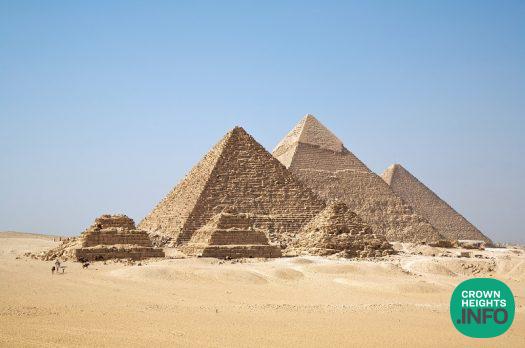
Weekly Dvar Torah: Come to Pharaoh – A Mission for the Seventh Generation
The Torah’s command to Moshe, “Come to Pharaoh” (בא אל פרעה), is more than a historical directive—it is a timeless calling. It is a mandate for every Jew, especially in the seventh generation, to confront the forces that obscure G-dliness and transform the darkness of exile into the light of redemption.
At first glance, the phrase “Come to Pharaoh” is puzzling. Why does Hashem say “Come” instead of “Go”? The Zohar explains that Moshe was afraid to face the spiritual root of Pharaoh—the essence of unholiness. Hashem, therefore, told him, “Come with Me.” This was not merely a confrontation but an invitation to reveal the deepest G-dly light within Pharaoh himself.
This idea is deeply connected to the mission of the seventh generation since the Alter Rebbe. The Rebbe, who is the seventh, teaches that just as Moshe’s task was not to escape Pharaoh but to transform him, our task is not to escape the world’s darkness but to illuminate it with the light of Torah and Chassidus. The seventh generation does not retreat from exile; it brings redemption into the exile itself.
The seventh generation is unique. In the words of the sixth Rebbe the Frierdiker Rebbe, the Rayatz, quoting the Midrash, “The seventh is always precious.” Just as Moshe, the seventh from Avraham, led the Jewish people to the revelation at Mt. Sinai, so too our generation led by the Rebbe the seventh from the Alter Rebbe, is charged with bringing the ultimate revelation—the coming of Moshiach.
This mission is directly connected to “Come to Pharaoh.” The challenges we face are not obstacles but opportunities. The concealment of G-dliness in the world today is our Pharaoh, and we must not be intimidated. Instead, Hashem tells us, “Come with Me.” When we engage the world with the confidence that Hashem is with us, we reveal its hidden holiness.
The Rebbe emphasized that our generation stands on the threshold of redemption. Our role is to reveal G-d’s presence within the world, not by running away from challenges but by transforming them. Just as Moshe brought the highest revelations into the lowest places, we are tasked with revealing G-dliness in every aspect of life.
This means that our work in business, law, medicine, and daily interactions is not separate from our Divine mission—it is integral to it. Every mitzvah, every act of kindness, and every moment of Torah learning chips away at the concealment of G-dliness and brings the world closer to Geula (redemption). The Rebbe constantly reminded us that we must not wait passively; we must actively transform the world into a dwelling place for Hashem.
In the final moments before Yetzias Mitzrayim (Exodus), Pharaoh’s resistance was strongest. Similarly, as we stand at the threshold of Geula, the challenges seem more daunting than ever. But “Come to Pharaoh” reminds us that the darkest moments precede the greatest revelations. Just as Moshe’s final confrontation with Pharaoh led directly to redemption, our engagement with today’s challenges is the final step before the revelation of Moshiach.
The Rebbe taught that our generation has been given everything necessary to complete the mission. We do not have to create something new—we only have to reveal what is already here. The concealment is but an illusion; Geula is a reality waiting to be uncovered. Our actions today—whether in spreading Chassidus, strengthening Yiddishkeit, or increasing in acts of goodness—are the keys to unlocking that reality.
On an individual level, every Jew has their own “Pharaoh”—their personal challenges, fears, and limitations. Just as Moshe was afraid to face Pharaoh, we, too, may feel hesitant to confront our struggles. But Hashem tells each of us, “Come with Me.” We are never alone in our struggles; Hashem is guiding us every step of the way.
Seventy-five years of the Rebbe’s leadership exemplifies this message. He did not fear confronting the darkness of exile; he illuminated it. Through his teachings and directives, he empowered us to do the same—to see every challenge as an opportunity to reveal G-dliness, to recognize that our mission is not to escape the world but to sanctify it.
The Rebbe identified our generation as the last generation of exile and the first generation of redemption. This means that we have a unique responsibility—one that no previous generation had. We must complete the mission that began with the Alter Rebbe and bring the world to its ultimate purpose.
The connection between “Come to Pharaoh” and our mission is clear. Moshe did not liberate the Jews by avoiding Pharaoh but by confronting him with Hashem’s presence. Likewise, we do not bring Moshiach by escaping the world but by engaging with it fully, armed with the light of Torah and Chassidus. The Rebbe’s teachings equip us with the strength to face every Pharaoh in our lives, revealing that even the greatest darkness contains hidden sparks of holiness waiting to be redeemed.
The words “Come to Pharaoh” resonate through history, calling upon each of us to step into our Divine mission. Just as Moshe confronted the essence of Pharaoh and revealed G-d’s absolute dominion, we are called to engage the world with unwavering faith, transforming every challenge into a vessel for holiness.
The seventh generation is the generation of transformation. With the Rebbe leading the way, we do not fear darkness—we illuminate it. We do not wait for Geula—we reveal it. And with every act of goodness and holiness, we hear Hashem’s voice urging us forward: “Come with Me.”
Have a Shabbos of Revealed G-dliness and Redemption,
Gut Shabbos
Rabbi Yosef Katzman
















Gershon Beck
Very good lesson that we learned. If anyone wants a good English translation of the sicha 5752 parsha bo , see the YouTube channel from Rabbi Mendel lipsker Melbourne Australia. He has many of the sichas 5751-5752 translated line by line. He also is a regular teacher on the project likuttei sichos. I try and tune in to him every week for some excellent learning from nisideraanu. Mashiach now!